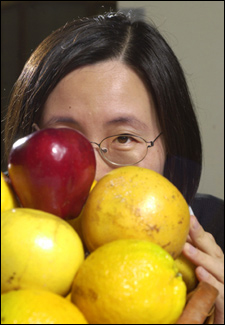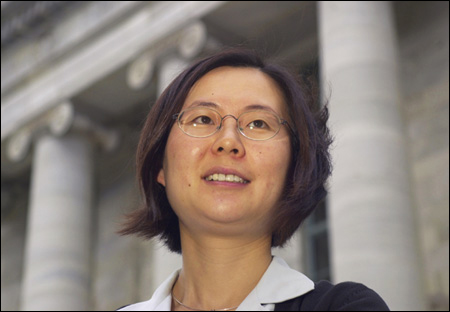Fruit helps prevent blindness
See your way to eating more fruit for better sight
Harvard researchers have shown that an apple a day isn’t quite enough to keep

the eye doctor away – at least for the most common type of blindness that afflicts the elderly.
Eunyoung Cho, a Harvard Medical School instructor and epidemiologist at Brigham and Women’s Hospital in Boston, found that it takes three servings of fruit to reduce the risk of neovascular age-related maculopathy (ARM).
Cho, working with colleagues from Harvard Medical School and Harvard School of Public Health, found that participants in two large-scale studies who ate three or more servings of fruit a day had a 36 percent lower risk of developing the condition than those who ate 1.5 servings of fruit per day or less.
Cho examined the diets of 77,562 women who participated in the Nurses’ Health Study and 40,866 men who participated in the Health Professionals Follow-Up Study.
Age-related maculopathy, also known as macular degeneration, is the leading cause of vision loss among people 65 and older.
Cho said that because ARM has limited treatment options, any information on how it can be prevented is critically important.
“It’s a relatively rare disease, but it is a leading cause of blindness among those over age 50,” Cho said. “Prevention of the disease is very important and we don’t know much about the risk factors.”

Researchers who worked with Cho on the study included School of Public Health Nutrition Department Chair Walter Willett; Johanna M. Seddon, associate professor at both Harvard Medical School and the School of Public Health; Professor of Medicine Bernard Rosner; and associate professor at Harvard Medical School and at the School of Public Health Susan Hankinson. Their results were published in the June issue of the Archives of Ophthalmology.
Participants were at least 50 at the beginning of the study and had no diagnosis of age-related macular degeneration. Women were followed for up to 18 years and men for up to 12 years. Participants reported their food consumption and their use of vitamins and dietary supplements.
Researchers documented 464 new cases of early-stage ARM and 316 cases of a more severe type of the disease, known as neovascular ARM.
Though researchers found a connection between fruit consumption and development of the disease, they found no connection between the consumption of vegetables, dietary supplements, or vitamins, a finding Cho said she thought surprising.
“We expected that antioxidant vitamins and carotenoids would reduce the risk,” Cho said.
Though there was a weak association with the consumption of carrots and a lower incidence of the disease, other vegetables – including leafy green vegetables – were not related to ARM.
Cho said the study’s results need to be replicated and future work will examine the role of the flavonoids in fruit as a possible protective factor against ARM.
Overall, Cho said, the study reinforces existing health messages that fruit is good for you. In addition to helping protect against ARM, fruit intake has been shown to help prevent heart disease and some cancers.
“It’s good to be eating fruits anyway,” Cho said.




